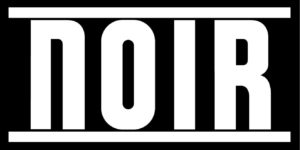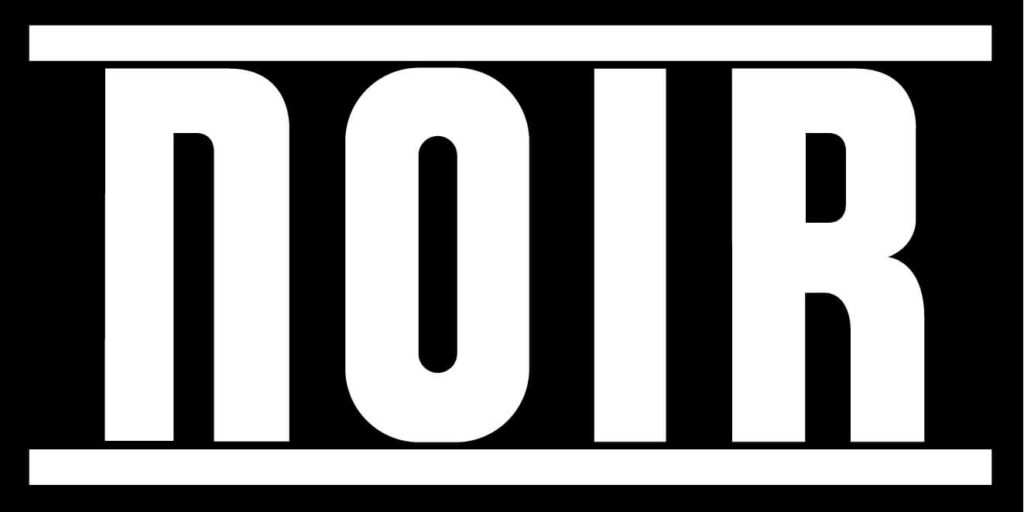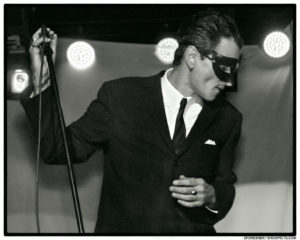We got the chance to pester ask Athan Maroulis of Spahn Ranch & Black Tape for a Blue Girl fame about his recent project NOIR. Read on to find out some bands he likes (that may surprise you) and what inspired NOIR. If you’re unfamiliar, head on over and check out our review of Darkly Near.

HN: I don't want to dig too deep into this, because this is about NOIR. But I have to ask about the transitional process between Spahn Ranch, Black Tape for a Blue Girl, and NOIR. I am curious about how your art moved in such a vastly different direction, what inspired this?
AM: In the year 2000 I was living in LA and had a promising life. I was pounding out albums and touring regularly with Spahn Ranch when suddenly a rupture in my personal life forced me to make some changes. Soon after SR cut our final album Closure and after 8 years we called it a day, I packed up and moved back home to Brooklyn where I literally semi-retired as a vocalist. While I continued to stay peripherally involved, cutting an odd track here and there, I did not perform live for nearly a decade. Sam from Black Tape for a Blue Girl and I always had a good connection, so during that long dormancy he asked me to cut vocals on few tracks for his album The Scavenger Bride in 2002. True, BTFABG was stylistically quite different from SR, yet I got my start many years before in a Goth band called Fahrenheit 451. Additionally I really liked atmospheric music so it wasn't a massive reach for me to sing with BTFABG. Only later in 2009 did I officially join BTFABG, there I started performing live again both here and overseas in support of the album 10 Neurotics.
Sam from BTFABG has an uncanny knack for recording, layering and editing vocals so working with him always yields fantastic results. BTFABG tends to take long breaks between albums so I decided to casually pursue a musical side-project and NOIR was indirectly born. I wanted to do something that could be beat conscious as well as moody where I could lyrically go back to my old ways. I had a friend who was willing to do the programming; ultimately we just went from there with the original intent of just cutting a single digitally. I've worked with Metropolis regularly over the years yet I never made an album for them as an artist; they liked the single and signed NOIR to cut an album. Artistically speaking NOIR wasn't that much of a transition, yet creatively it proved challenging because writing and arranging the album via email with a long distance collaborator is indeed frustrating. Secondly, trying to write melodies and lyrics for an entire album wasn't easy after being away from it for so long. After all in BTFABG I co-wrote a bit with Sam but with NOIR the vocals were all on me. I had to revert to themes and moods found in my old attaché of lyrics from the past then find a way to merge it with the present. Truth is I can sing nearly anything from 1930s standards to 1970s glam rock so leapfrogging stylistically comes very naturally to me.
HN: What I've noticed to be consistent in your music is the rich atmospheric background that looms in nearly every track. How the hell are you doing this?
AM: I tried my best to layer the vocals wherever I could, in part because this brand of music isn't exactly the most melodic in the world. Therefore, one way to keep the vocals interesting is to try and use different textures and approaches. Producer Raphael Pepi helped intensify the overall dynamics and was an integral part of the process. It also helps that the programming itself is quite good and rich as it is perfectly sparse, this by my “anonymous” collaborator.
HN. I really love the second track on Darkly Near, “The Bells”. I feel like it's an excellent synthesis of old and new style darkwave/gothic. At this point in the album, I wondered are you more analogue or digital. SO, are you more analogue or digital?
AM: Thanks; I myself am also partial to “The Bells.” We did, in part, indirectly make this album an homage to the analog synth era and I am glad you picked up on it.
HN: Darkly Near provides both the feel of your signature gothic tracks as well as this new variety of sounds and beats exclusive to NOIR. I like that there seems to be nothing uniform about the album. There's variation with every track. Was this purposeful?
AM: Thank you. I mentioned something regarding this earlier. I feared the idea of too much sameness on the album so I did go out of my way to try and set each song apart as much as I could. I am not a very good musician, I cannot read nor do I understand keys or chords so it is all just instinct for me. That said, vocal phrasing, musical accents, layering, beat fluctuation are all things we tried to implement wherever possible on the album to conceptually make it more of an interesting listening experience.
HN: The eighth track “Timephase” has this cool progression, and it's all being moved along with a deep, dark, wet bass. What is it? It's cool!
AM: Oddly enough, I originally co-wrote this song with Reza from the band Inertia in the late 1990s under a finite project we had together called The Third Man. I always liked the song so as we were compiling the material for the actual NOIR album I thought “Timephase” might make for a perfect addition and with its slight Middle Eastern vibe would provide some variety. The song didn’t have a bridge so I sort of pinched the original vocal ending to build a faux bridge near the middle of the song. As for the sounds, well, in this day and age a man has got to have some secrets.
HN: You've obviously been in the music scene for a good while and I have always felt that you were extremely poetic, even for a lyricist. Were you first a writer or a musician?
AM: I have always been a singer starting around the age of five, yet I did fancy myself a “poet” in my early collegiate years which coincide with my first original band Fahrenheit 451. I started a practice of writing poems then later twisting them into song lyrics. Writing does not actually come very naturally to me so I have to put in many hours of penning word games and melting phonetics together to eventually have results. What I do like about it is that you can really write your own rules, utilize diaries from the past and present then figure out a way to sew thoughts, dreams and reality all together.
HN: Your cover of The Cure's “A Forest” is awesome, what inspired you to cover this?
AM: Although I was pleased with the results, I was actually I was dreadfully opposed to recording this. It was the idea of a collaborator of mine who prefers (as I already mentioned) to remain anonymous. Truth is, as we finished the original single I thought it would be ideal to add a second song even if it had to be a cover. “A Forest” happened to be in the can so I was left with little choice. I always liked the song but never thought I could bring anything new to the tune. So there you have it.
HN: Tell me of some bands that no one would ever suspect you'd be a fan of?
AM: T. Rex, Love, Television, America, Blondie, Motorhead and many more. Perhaps I should leave it there? I don’t want any of the children of the night to disown me. Ha ha!
HN: This is purely out of personal interest; will you be touring anytime soon?
AM: In October we completed a mini tour built around the release date of Darkly Near, although right now I have no plans of touring and prefer to do select shows. Truth is I toured so much with Spahn Ranch I almost cringe at the idea of touring again. I love performing but don’t miss the waiting around and all the stressful parts of van tours. I must say I do love my current live band that consists of Demetra Songs and Kai Irina Hahn on keyboards and vocals. Personally, I prefer the company of women.
[amazonmp3 asin=”B00EOO47J8″]

